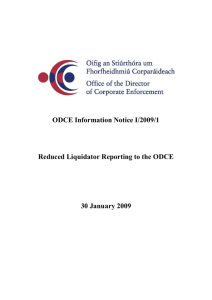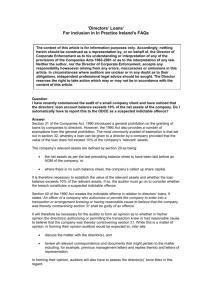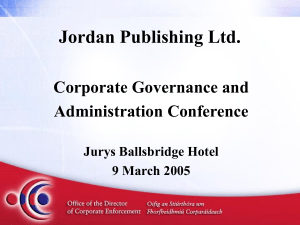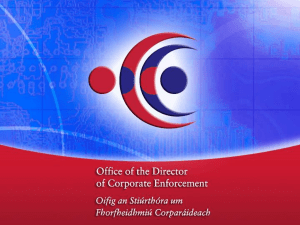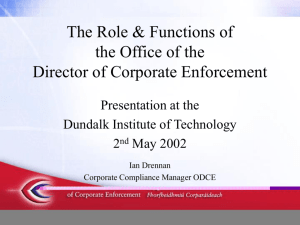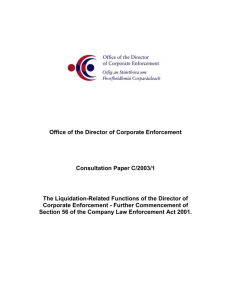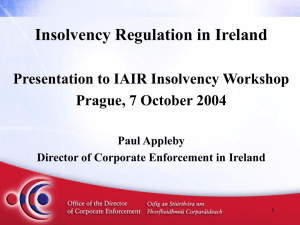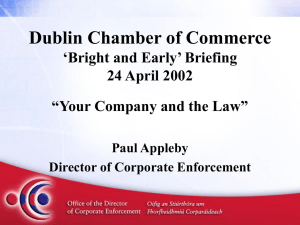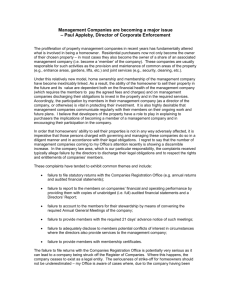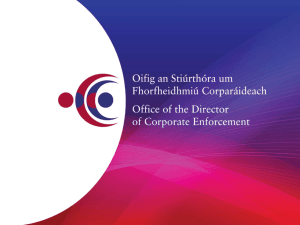Presentation - Office of the Director of Corporate Enforcement
advertisement
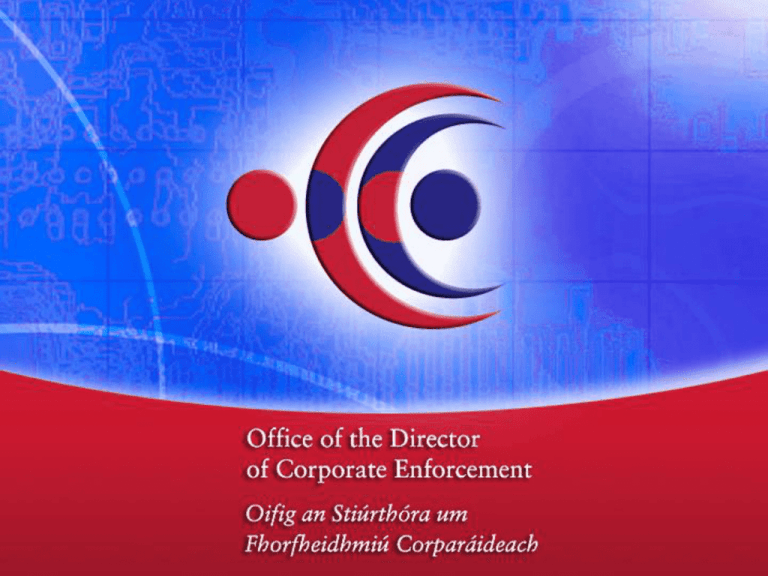
Presentation to the Annual Conference of the Institute of Chartered Secretaries and Administrators Conrad Hotel, 16th October 2002 Ian Drennan, Compliance Manager ODCE Presentation Overview • • • • • • Overview of the ODCE Role of the ODCE Mandatory Reporting Obligations Consequences of Non-Compliance More Common Breaches ODCE Services and Sources of Further Information Overview of the ODCE • Independent statutory Office • Established under the Company Law Enforcement Act, 2001 (CLEA) • 37 staff – multidisciplinary • Location – NB moving shortly! Company Law Enforcement Act, 2001 In addition to establishing the ODCE, the CLEA provided: • that the enforcement of filing obligations remain with the Registrar • for other measures to streamline enforcement e.g. introduction of the concept of an Annual Return Date (ARD) • for the introduction of new reporting obligations on certain parties Role of the ODCE • The ODCE’s role is set out in the CLEA • Two primary roles: – a compliance role, and; – an enforcement role. Compliance Role • Encourage compliance through, inter alia: – – – – education and raising of awareness issuing of publications provision of information to the public (non-advisory) engaging with professional, trade and other representative bodies Compliance Role • Consultation Papers • Decision Notices • Other publications on an ongoing basis e.g. Introduction to the ODCE, ODCE Annual Report, Guide to the CLEA etc. • Website: www.odce.ie Enforcement Role • Prosecution of offences or referral for decision to prosecute • Imposition of fines in lieu of prosecution • Investigative role Enforcement Role • Role in relation to companies in liquidation and insolvent companies • Supervision of liquidators and receivers • Receipt of mandatory reports Mandatory Reporting Obligations • Professional Bodies: failure of a liquidator or receiver to maintain appropriate records commission of an indictable offence during the course of a liquidation or receivership • Auditors: indictable offences • Liquidators: report on the conduct of company directors reporting of criminal offences to the Director Auditors’ Reporting Obligations • The CLEA 2001 introduced a new reporting obligation on company auditors. Auditors are now required to report to the ODCE where they have reasonable grounds for believing that an indictable offence under the Companies Acts has been committed by a company or an officer of the company. • Joint guidance published by ODCE and the Auditing Practices Board (APB) to assist auditors in discharging their duties in thie regard. • Guidance available on www.odce.ie Auditors’ Duty to Report under S74, CLEA 2001 • Indictable offences • Does not apply to accountants’ non-audit work • However, auditors must have regard for matters coming to attention during the course of non-audit work • No requirement to seek out offences (over and above normal audit procedures). However, auditors are expected to react to information coming to their notice • SAS 120 and 620 of particular relevance Auditors’ Reports - Contents • • • • • • Auditor details Details of the company/persons the subject of the report Whether the matter has been discussed with the directors Details of the suspected offence(s) Details of the grounds Context (e.g. extent investigated, rectification steps taken) Liquidators’ Duty to Report under S56, CLEA 2001 • “a liquidator of an insolvent company shall, within 6 months after his or her appointment or the commencement of this section, whichever is later, and at intervals as required by the Director thereafter, provide to the Director a report in the prescribed form” (Section 56(1) CLEA, 2001) Liquidators’ Duty to Report under S56, CLEA 2001 • Applies to liquidators of insolvent companies only • Applies also to shadow directors • Director can relieve the liquidator in respect of less than the full complement of directors • ODCE will not subsidise legal costs. However, the Court can direct that the restricted person(s) bear the costs of the application(s) • First liquidators’ reports due in by 30th November (commencement date 1st June 2002 I.e. appointed thereafter of liquidation ongoing on that date). Information Required in Liquidators’ Reports • • • • • • Liquidator’s details Type of liquidation Date of appointment Company details Directors’ details Liquidator’s opinion as to whether each director acted honestly and responsibly in the conduct of the company’s affairs • Statement of affairs • Audited financial statements • Report to creditors (including of minutes of creditors’ meetings) • Whether the liquidator intends to apply for restriction or disqualification • Details of any other civil or criminal proceedings in train or anticipated • Presence of any criminal offences Consequences of Non-Compliance • Admininstrative fines – maximum €500 • Prosecution – In general, maximum penalties under the Companies Acts are: – €1,900 and/or 12 months imprisonment on summary conviction, and; – €12,700 and/or 5 years imprisonment on conviction on indictment. Consequences of Non-Compliance • Significantly higher penalties are available for certain offences e.g. – fraudulent trading: €63,500 and/or 7 years – insider dealing: €254,000 and/or 10 years Restriction • Provision for the restriction of directors (and secretaries) was originally introduced by S150, CA 1990 • S150 allowed, but did not require, liquidators of insolvent companies to apply for the restriction of company directors • CLEA 2001 requires the liquidators of insolvent companies to apply for the restriction of the directors unless relieved of the obligation • Director can also apply for restriction orders Restriction • Saver where a person can demonstrate that they have acted honestly and responsibly • Restriction orders last for 5 years • Companies having a director or secretary who is restricted must satisfy certain criteria: i.e. - minimum fully paid up share capital of €63k (€317 for plcs) - each share must be paid for in cash Disqualification • Provision for disqualification was originally introduced by S160, CA 1990 • Persons subject to a disqualification order are precluded from acting as director, secretary, auditor, liquidator, receiver or examiner. • Disqualification can be automatic or discretionary, depending on circumstances. • Lasts 5 years Disqualification Disqualification is automatic in the following circumstances: • where an individual is convicted on indictment of any indictable offence relating to a company or involving fraud or dishonesty • where a person is convicted of acting in contravention of a restriction order (also an offence) • where a person is convicted of acting in contravention of a disqualification order – disqualification is extended for a further 10 years (also an offence) Disqualification The Court has the discretion to issue a disqualification order where a person involved in a company has been guilty of, inter alia: • • • • • • a fraud in relation to the company, its members or creditors a breach of duty in relation to the company persistent default in relation to CA obligations two or more counts of failure to maintain proper books of account reckless trading fraudulent trading More Common Breaches • • • • Failure to keep proper books of account Illegal transactions with directors Failure by directors to hold AGMs and/or EGMs Failure to maintain the required registers and/or make them available to entitled parties • Trading while insolvent Steps to Improve Compliance • Stress that company property and directors’ property are not one and the same - and that directors should accordingly • Keep the necessary registers, minutes etc. • File the necessary documents with the Registrar • Convene an AGM and EGMs as required Steps to Improve Compliance • Ensure that company transactions with directors are lawful e.g. avoid misapplication of company assets etc. • Maintain proper books of account • Prepare and regularly review management accounts with a view to timely identification of potential solvency problems. If there is a solvency problem? • Seek professional advice i.e. accounting, secretarial and legal • If insolvent, cease trading i.e. don’t incur further debts and do not accept prepayments/deposits from customers • Don’t engage in selective discharge of debts e.g. discharging bank liabilities carrying personal guarantees in preference to other creditors (including Revenue). ODCE Services Compliance Information Service (draft Notices) General Information Service (info@odce.ie) Complaints Facility (complaint form available at www.odce.ie) Registration Service (via www.odce.ie) FOI Service (foi@odce.ie) Feedback Facility (feedback@odce.ie) Further Information www.odce.ie decision notices exemptions granted re applications for restriction court decisions prosecutions company investigations restrictions disqualifications Thank You
